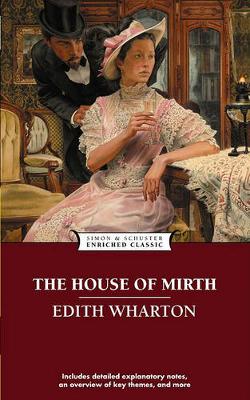Reviewed by gmcgregor on
Instead, she feels no chemistry with Percy and earns the ire of married socialite Bertha when Bertha's ex-paramour Lawrence Selden turns up to see Lily. Bertha splits up the budding romance between Lily and Percy, leaving Lily in a position to have to ask Judy's husband, Gus, to make some investments for her to help keep her afloat. Gus views this as an investment in earning Lily's...favors, and though she manages to keep her head above water and even rise briefly, it all comes crashing down when Bertha invites Lily on a trip to keep her husband George distracted while Bertha carries on with her latest conquest. When George discovers the truth, though, Bertha spreads lies painting Lily as a temptress instead, which begins Lily's descent through the social classes.
This book plays with the same kind of themes Wharton would return to in her Pulitzer Prize-winning The Age of Innocence, which I read a few years before I read this: the artificiality of the upper-class New York "society" in which Wharton herself was born and raised and the way it constrains and even punishes real feeling primary among them. Lily herself is a great heroine: it's so easy to identify with her simultaneous longing to do the "right" thing and make it easy on herself by just finding someone rich to marry her and keep her in comfort and to be true to herself and wait for the kind of real connection she feels with Lawrence. Even though women are by and large much less dependent on men for material support today, I think there still exists the temptation, especially as one approaches 30, to just settle for someone good enough and check "marriage" off the list of things you constantly get asked about as a woman. And the power of the rumor mill, and its ability to ruin reputations, remains potent.
It's thematically similar enough to The Age of Innocence that comparison is inevitable, and for my money, Innocence is the better-developed and more rewarding work. But Mirth was also written 15 years beforehand, so it's not surprising that it's less mature. It does bring the added context of a female perspective, and it's partly refreshing to see how far we've come and at the same time how many things are still largely the same in terms of the constraints that society as a whole places on women. I will say one of the things that didn't quite work for me was the novel's central romance: it's never really developed, we're just meant to sort of assume that they've fallen for each other. It's necessary to have established for a late character moment to work, but it's done so superfluously that it doesn't quite have the power it could have. All in all, if you like a sharp social critique and old-society novels, or just like Wharton, it's definitely worth reading. Otherwise, pick up The Age of Innocence instead.
Reading updates
- Started reading
- 22 November, 2017: Finished reading
- 22 November, 2017: Reviewed
